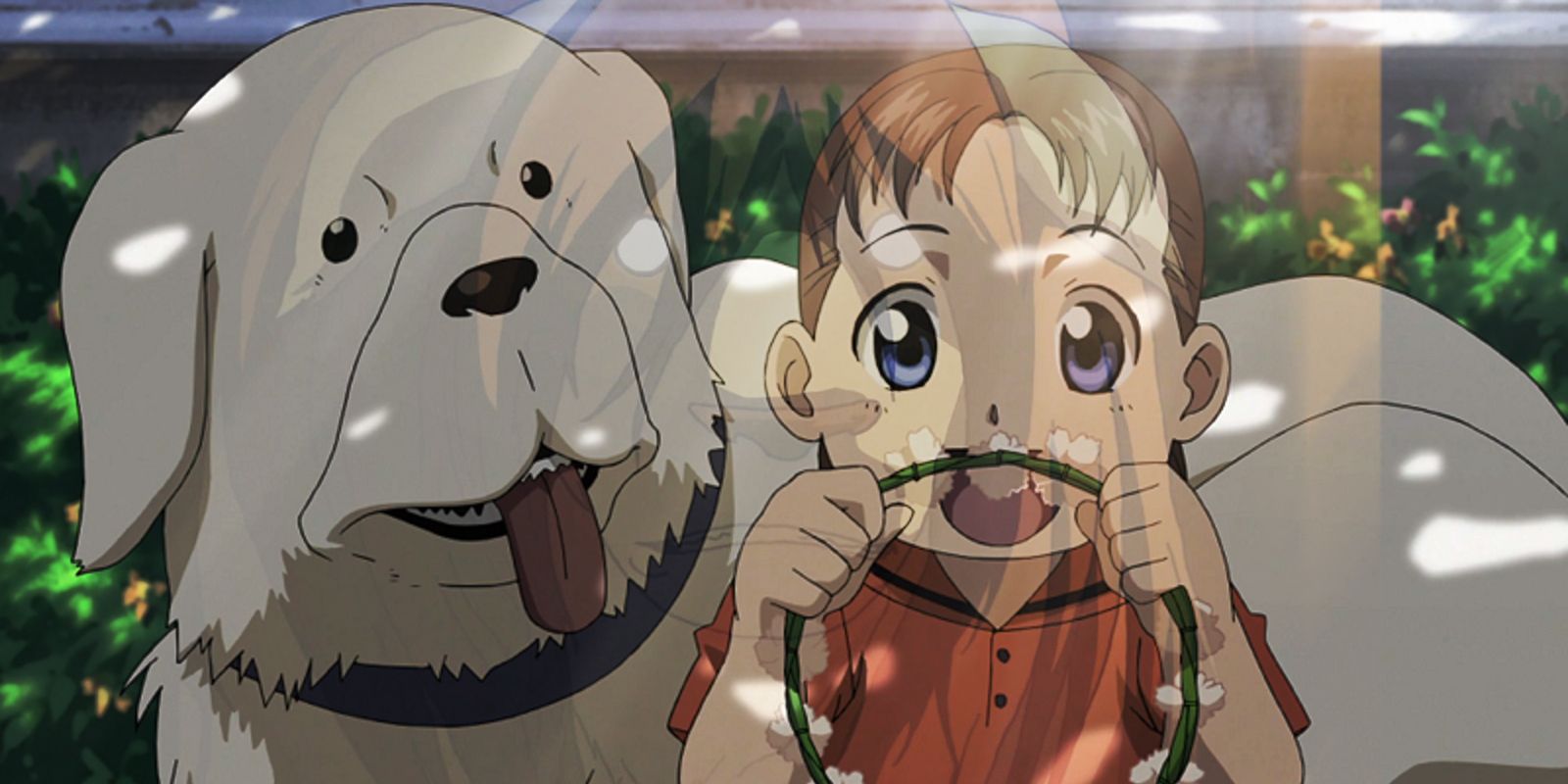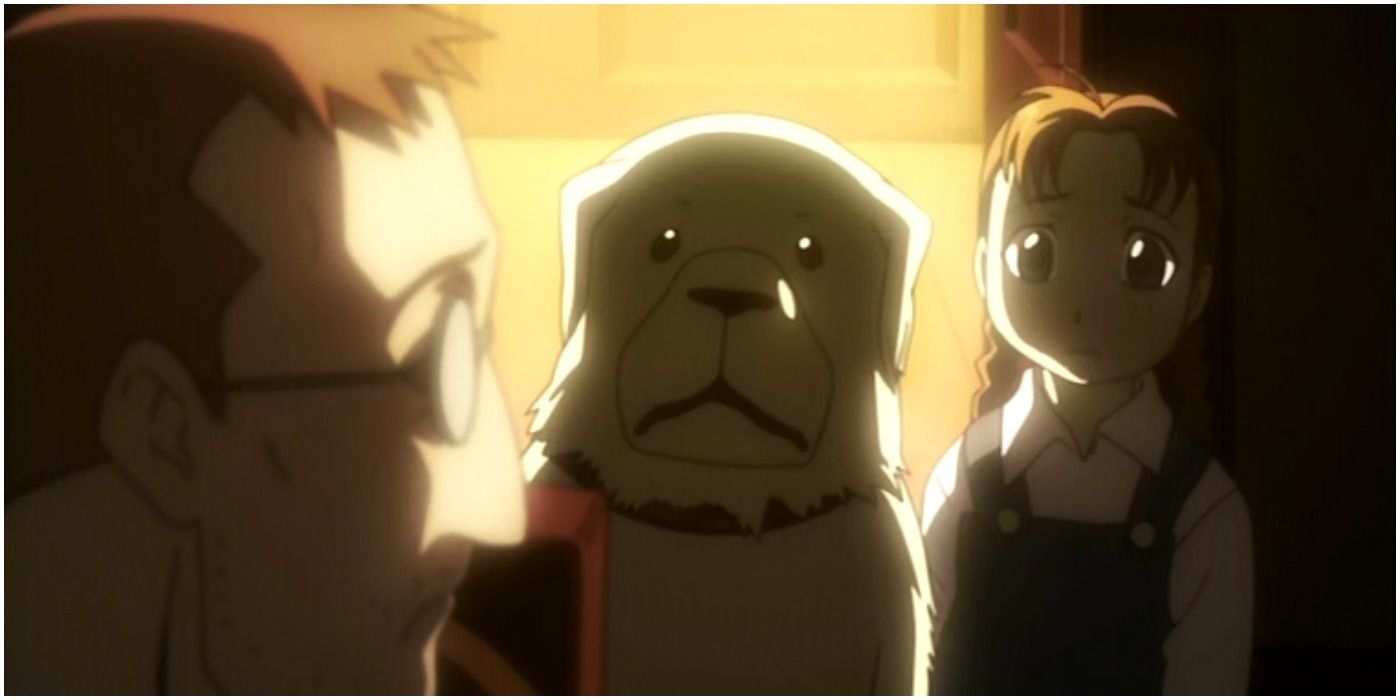If near escapes and miraculous rescues are your thing, it's best to stop now: anime is notoriously unafraid to kill off vast numbers of people, and sometimes those people haven't even left childhood. Whether it's baby Conny in The Promised Neverland, the Hyakuya Orphanage in Seraph of the End or even Honma Meiko from Anohana, children from all genres are fair game when it comes to the anime scythe. However, there is one child victim that the anime community at large still can't seem to forget -- Nina Tucker from Fullmetal Alchemist and Fullmetal Alchemist: Brotherhood.
Nina's transformation into a chimera by being fused with her beloved dog Alexander is still a particularly tender spot over ten years down the road from the conclusion of FMA:B, as is her resulting death, and her father is universally reviled for her murder. However, while Nina is undoubtedly a tragic character, is there a reason her death resonates so strongly with audiences, especially in a show that already includes mass genocide, body horror and the deaths of many other beloved characters? Nina is in fact much more than just another child death; it is the themes and emotions aside from grief that her death dregs up that make her stick in the mind so effectively.
First and most basically, Nina's death is a betrayal on a fundamental level of parent to child; one of society's most taboo actions. As if a father sacrificing his daughter wasn't enough, when Fullmetal Alchemist places so much importance on familial relationships, Shou Tucker's usage of his only daughter is even more sickening in contrast. Shou Tucker and Nina also set up a beginning of father/child relationships in the story that finally gains resolution by the finale, when Edward is able to reconcile with his own father.
Shou Tucker, the Dwarf in the Flask and von Hohenheim do all at some point represent the errant father who either neglects his children or is willing to sacrifice them altogether. Shou Tucker, being the latter, is unforgivable both in the story and by the morality of our own society, while the Dwarf in the Flask is merely the escalation of Shou Tucker's ideals, willing to sacrifice anything he needs to in order to achieve his goals.
Second, there was the possibility that Nina could have been saved. With child deaths in anime, there is often a sense of inevitability to them. Conny in The Promised Neverland could not have been saved. Norman and Emma arrive too late to save her life, and even if they had come earlier, they wouldn't have been to do much besides die themselves. However, Edward and Alphonse spend the days before Nina's transformation at the Tucker home, learning half-truths about the previous talking chimera and hearing the tale of Nina's missing mother. They arrive back at the Tucker house to find the chimera that was created from Nina and Alexander, and realize with horror when Nina speaks to Edward just what had happened.
Every sign was there, and the brothers take it hard. This is a huge personal failure for them, showing them as unable to protect a single little girl. Once is not enough, however, as Nina is soon killed by Scar, when the avenging assassin arrives to take Shou Tucker's life. Although killing Nina is an act of mercy from Scar, it is nevertheless what takes Nina away for good. In this way, Nina Tucker dies twice, and the Elrics feel entirely responsible and helpless.
The way Nina's death is framed also leads to her lasting impact. While many child deaths occur to kickstart a story with an unexpected sacrifice -- The Promised Neverland and Seraph of the End both place obvious instances of child death in the first episode or so -- Nina is not introduced until several episodes in, and because the show had just rounded off its first action-packed episodes, it was easy for audiences to let their guards down with a sweet little girl weaving flower crowns.
Moreover, because Shou Tucker was introduced as a reliable, helpful character, there was no need for immediate alarm, especially compared to the recent introduction of Lust, Gluttony and Envy. However, while child deaths at the beginning of shows can be played for effective shock value, Nina's was simply shocking, sending the plot rocketing forward by timing her demise just when the series might have taken a lull.
The result of the timing, preventability and sheer atrocity of a father experimenting on his child in an anime so focused on the importance of family cemented Nina Tucker as one of the most tragic child deaths in all of anime. The plaintive cry of "Ed...ward" is likely something many can still recall quite vividly, as well as the horror of realizing that the Elric brothers weren't going to make it in time to save the day. Nina Tucker's death was the realization that Fullmetal Alchemist is not about tragic backstories, but tragic lives as well, which helped to make it one of the most beloved anime of all time.



